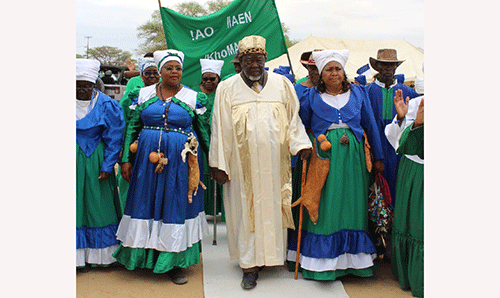The Damara People’s Assembly, the community’s highest decision-making body, was held in Windhoek last weekend.
The gathering afforded the tribe’s men, women and youth a platform to exchange ideas and map the way forward.
Discussions were candid but remained within the confines of respectful engagement, Damara King’s Council secretary general Abner Axel Xoagub told New Era this week.
He said recommendations and resolutions taken at the meeting will be forwarded to the Damara King’s Council for final submission.
According to Xoagub, the convention consolidated information from conferences held in Otjiwarongo, Swakopmund and Windhoek.
He said on top of the agenda was the identity and socio-political, socio-cultural and socio-economic history of the Damara community within and outside the borders of Namibia.
He said, among other things, the meeting decided to discourage Damara people from disposing of immovable property, particularly houses in urban areas, and to encourage them to engage in self-sustaining economic activities instead, such as farming, selling cash products, home gardens and real estate investments, as well as making sure their children have access to education and training, and that they are qualified.
Xoagub said the meeting also warned the youth against the adverse effects of substance abuse, both alcohol and drugs, and to refrain from unsavoury and unproductive conduct, such as involvement in criminal activities.
“Teenage pregnancies should be avoided, and children should not drop out of school because of pregnancy-related causes,” Xoagub said.
Xoagub said the meeting also resolved the community to preach family planning like a gospel among the youth to tackle generational poverty.
During the meeting, Xoagub said, King Justus ||Garoëb made a clarion call on all the members of the Damara community to promote unity amongst the community as well as to strive for a harmonious co-existence with the other inhabitants of the country.
||Garoëb expressed profound gratitude towards the female members of the community, for the production and wearing of the horokhoes with pride, since it not only depicts the traditional attire of the Damara women but it also denotes a sense of belonging and an indisputable identity.
In addition, according to Xoagub, the meeting also resolved to make efforts to ensure all the chiefs of the Damara people who are heading clans of recognised Damara Traditional Authorities take up their seats in the Damara King’s Council as per the supreme customary law of the community.
In this regard, he said the working group on the recognition of traditional authorities should step-up efforts aimed at ensuring the remaining clans of the Damara Traditional Community are recognised and gazetted.



